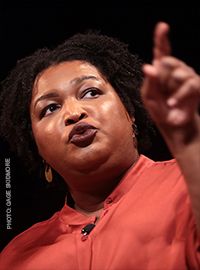| GOP Pushes Back On Democratic 'Big Lie' |
 |
|
By Byron York
Wednesday, January 12 2022 |
President Joe Biden and Vice President Kamala Harris traveled to Georgia Tuesday to push their party's bill to federalize U.S. election procedures on terms favorable to Democrats. "We are going right to the belly of the beast, or ground zero, for voter suppression, voter subversion and obstruction," senior White House official Cedric Richmond told Politico. Led by Stacey Abrams, who refused to accept the results of the 2018 Georgia gubernatorial election (she lost), Democrats have used the unsupported notion of widespread voter suppression as the foundation for two bills – the "For the People Act" in the House and the later "Freedom to Vote Act" in the Senate – that would throw out every state voter ID law in the country; that would legalize ballot harvesting nationwide; that would mandate universal mail-in ballots; that would mandate nationwide same-day and automatic voter registration; that would mandate nationwide acceptance of late-arriving mail-in ballots; that would remake the campaign finance system; and much, much more. One bill has already passed the House, where it is easier to pass partisan measures, even when one party has only a tiny majority. But there is no way in the world the bill can pass the Senate, where Democrats do not control a majority of the seats. There's no proof Democrats can even win a simple majority vote – that is, muster all 50 Democrats for the bill and then rely on Vice President Harris to break the tie – much less that they can overcome the 60-vote hurdle posed by a Republican filibuster. So of course Democrats want to get rid of the filibuster. But even if they could do that, they would be left with the 50-votes-plus-Harris strategy, and at the moment, at least two Democratic senators – Joe Manchin and Kyrsten Sinema – aren't going along. You can't enact anything in the Senate with 48 votes. And now, Senate Minority Leader Mitch McConnell and his GOP allies are pushing back. "The political left keeps pitching their big lie that mainstream state voting laws are somehow 'Jim Crow 2.0' if the governor who signs the bill happens to be a Republican," McConnell said last week. "In one of the states that triggered this meltdown, the new proposals mandated more days of early voting than many Democrat-run states provide. Our democracy is not in crisis. Repeating this rhetoric does not make it factual. The 2020 election saw the highest turnout in more than 100 years." As for the filibuster, McConnell noted that just a few years ago, in 2017, 32 Senate Democrats – including then-Sen. Kamala Harris – signed a letter opposing changes in the legislative filibuster. And a decade before that, current Majority Leader Charles Schumer vigorously resisted getting rid of the filibuster. "The ideologues in the Senate want to turn what the Founding Fathers called the cooling saucer of democracy into the rubber stamp of dictatorship," Schumer said in 2005. "They believe if you get 51% of the vote, there should be one-party rule. ... They want to make this country into a banana republic where if you don't get your way, you change the rules. It'll be doomsday for democracy if we do." Doomsday for democracy if the filibuster were eliminated! Now, of course, Schumer believes the precise opposite of what he said back then. Given his statements and actions, it is no exaggeration to say that Schumer's hypocrisy, when it comes to the legislative filibuster, is simply off the scale. (McConnell's is not; when then-President Donald Trump urged majority Republican senators to get rid of the legislative filibuster, McConnell said no.) Why is this fight happening now? Democrats appear to be deeply frustrated by their inability to pass their current top priorities – the far-reaching voting bills, plus yet another huge spending bill – with their 50-vote non-majority in the Senate. Their ambitions have outstripped their power in the Senate for the last year. Now the approach of midterm elections makes it even more difficult to get what they want done. So they are lashing out at Republicans and seeking to change the rules. Look for more, not less, of that as the elections grow nearer. Byron York is chief political correspondent for The Washington Examiner. COPYRIGHT 2022 BYRON YORK |
Related Articles : |
























